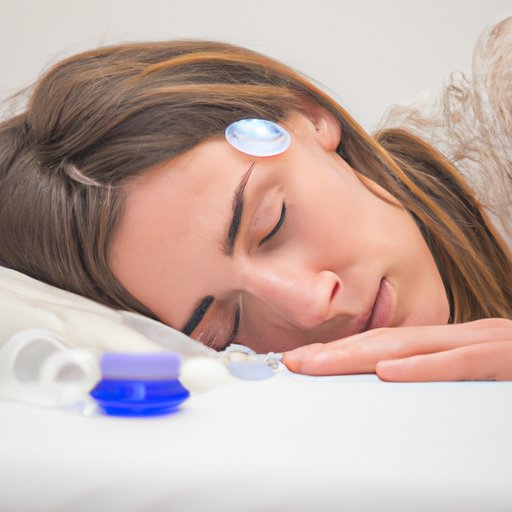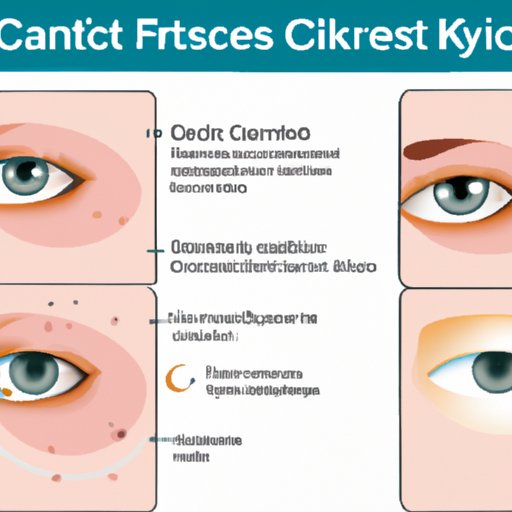
Introduction
Many people have fallen asleep with their contact lenses still on at one point or another, but it’s important to know about the harm it can cause. Sleeping with contacts in can lead to irritation, infection, or even vision loss. Proper care is crucial to maintaining healthy eyes and good vision.
Health Effects of Sleeping with Contacts
The list of potential risks and effects associated with sleeping with contact lenses is quite extensive. A few of the most common ones include:
Increased Risk of Infection
One of the most serious risks of sleeping with contacts in is the increased likelihood of developing an eye infection. The lenses can trap bacteria against the eye, leading to conditions like keratitis (inflammation of the cornea) or conjunctivitis (pink eye).
Corneal Damage or Abrasions
As you sleep, your eyes produce less oxygen, making the cornea more vulnerable to damage from lenses that aren’t breathable. Sleeping with contacts in can result in scratches or abrasions on the cornea, which may lead to infection or more severe vision issues.
Redness, Dryness, and Irritation
Wearing contacts for an extended period without proper cleaning or removal for sleep can cause redness, dryness, and irritation. This can lead to discomfort and make it harder to focus during the day.
Lack of Oxygen to the eyes
The little oxygen that reaches the cornea when you are wearing a contact lens gets even lower if you sleep with them in your eyes. This decrease in oxygen supply can cause the overgrowth of blood vessels in the cornea and can weaken the eye’s tissue.

Risks Associated with Sleeping with Contacts
There are several risks associated with sleeping with contacts, including:
Bacterial Buildup on Lenses
The longer you wear your contacts, the more likely it is that bacteria will build up on them. Sleeping with lenses in increases this buildup and can lead to serious infections. It’s important to clean and disinfect lenses properly to reduce the risk of infection.
Risk of Corneal Ulcers
Corneal ulcers are sores that can form on the cornea through various means, including trauma to the outer layer of the eye caused by contact lenses. Sleeping with contact lenses can increase the risk of developing corneal ulcers, which can permanently damage the eye.
Potential Vision Loss
Although rare, sleeping with contacts in can lead to permanent vision loss. Continual irritation and infection can cause damage to the cornea and other parts of the eye, ultimately leading to vision damage or loss.
Higher Incidence of Eye Infections
Studies reveal that people who sleep with contact lenses on have a higher incidence of eye infections than people who do not. Bacteria thrive on the moist environment of the eye, and staying in contact lenses overnight will serve as a breeding ground for them.
How to Properly Care for Your Eyes When Wearing Contacts
The good news is that following best practices for contact lens hygiene and care significantly lowers the risk of complications. Here are some critical practices:
Cleaning and Disinfecting Lenses
Before inserting contact lenses, always wash your hands thoroughly. Using only fingertips, gently rub the contact lens with a few drops of contact lens solution to clean and disinfect it, then rinse it with sterile saline solution. Replace the contact lens case about every three months.
Soaking Lenses Overnight
Disposable contact lenses are not meant for reuse, and the user must change them as recommended by a doctor. Sleeping with your lenses in, especially those recommended for daily use, increases the risks associated with contact lenses. Overnight soaking of your contact lenses will help keep them clean and free from bacteria. At night a disinfectant solution is advised to clean the contact lenses.
Replacing Lenses Regularly
Following a proper contact lens replacement schedule will help avoid excessive eye irritation and infection. It is recommended that soft lenses get replaced every fortnight, biweekly, or monthly basis, while hard contacts are to be replaced yearly basis or after every six months.
Visiting the Eye Doctor Regularly
Contact lenses wear is supervised by optometrists. The doctor will conduct routine checkups on the wearing of the contacts. It is advisable to have a yearly checkup if you are a consistent contact lens user to guarantee that the wearing of the contacts isn’t damaging your eyes.
What to Do If You Accidentally Fall Asleep with Contacts In
If you fall asleep with your contact lenses in, take the following steps:
Avoid Rubbing Your Eyes
The first thing to do is to avoid rubbing your eyes. Rubbing your eyes can cause significant harm if you are wearing contact lenses because it can make the lenses scratch the cornea or make germs from your hands go straight into the eye.
Remove Contacts Immediately
The moment you wake up or realize you have slept in your contacts, remove them immediately. It is important to dispose of them if you wear daily disposable contacts, but for others, the lenses can be disinfected and kept in a clean contact lens case for reuse.
Use Lubricating Eye Drops to Reduce Discomfort
Using lubricating eye drops can help reduce the dryness and discomfort you may feel. However, if the discomfort persists, it is recommended to visit your eye doctor for an evaluation and treatment.
Seek Medical Attention if Necessary
If you experience severe pain or redness or if your vision changes, you should seek immediate medical attention.
The Impact of Sleeping with Contacts on Your Vision
Sleeping with contacts in can have serious, long-term consequences on your vision, such as:
Temporary or Permanent Damage to the Cornea
The increased risks of infections, corneal ulcers, and abrasions are critical sources of potential damage to the cornea. If left untreated, the damage could become permanent, severely impacting vision.
Distorted or Blurred Vision
Wearing contacts for an extended period or without proper cleaning can cause distorted or blurred vision. It can be resolved with some lubricating eye drops, but if the lenses have affected your vision, you should avoid using them to rest your eyes and visit your optometrist to get a new pair.
Increased Risk of Developing Astigmatism or Other Vision Problems
Long-term contact lens wear may lead to an increased risk of developing astigmatism or other vision problems, including farsightedness, nearsightedness and even amblyopia, also known as lazy eye.
Alternatives to Sleeping with Contacts
If you’re looking for alternatives to wearing your contacts while sleeping, consider the following:
Glasses
Wearing glasses instead of contacts to correct your vision is a simple and safe alternative. Glasses do not cause infections or damage, and you can take them off before sleep and rest your eyes.
Prescription Goggles
If you’re an athlete and don’t want to wear glasses that can slip off quickly, you can wear prescription goggles. Prescription goggles come with proper correction in the lenses and will protced your eyes from dirt and debris.
Orthokeratology
Orthokeratology (Ortho-k) is a technique that uses specialized contact lenses to reshape the cornea overnight, so you don’t have to wear contact lenses or glasses. Ortho-k lenses preserve clear vision throughout the day, helping you avoid the need for glasses or contacts.
Common Misconceptions About Sleeping with Contacts
There are several common misconceptions surrounding sleeping with contact lenses, such as:
“I can’t wear contacts because I sleep with them.”
The truth is, you can wear contacts if you have healthy eyes and take proper precautions. While wearing contact lenses overnight is generally not recommended, extended-wear contact lenses are available and can be worn for up to 30 days and 30 nights.
“I’ve slept with contacts before, and nothing happened.”
While it is true that nothing might happen after one night of sleeping with contacts, the risk increases with each additional night, and it may cause severe vision damage. Furthermore, your eyes might get swollen, itchy, and red due to a lack of oxygen supply during the night.
“I can’t feel anything when I sleep with contacts in.”
Maintaining a proper hygiene habit such as removing your contact lenses before sleep is essential for keeping your eyes healthy and safe from any bacterial or irritational infections, even though you don’t feel any discomfort or dryness.
Conclusion
Sleeping with contacts can cause various health problems, from bacterial buildup, redness, and irritation to significant vision loss and infections. Proper contact lens care and hygiene are essential in maintaining healthy eyes and lowering the risk of complications. While wearing contact lenses have become a norm in today’s generations, it is essential to take a break from time to time, visit your optometrist, and explore alternatives such as Ortho-k or eyeglasses.





